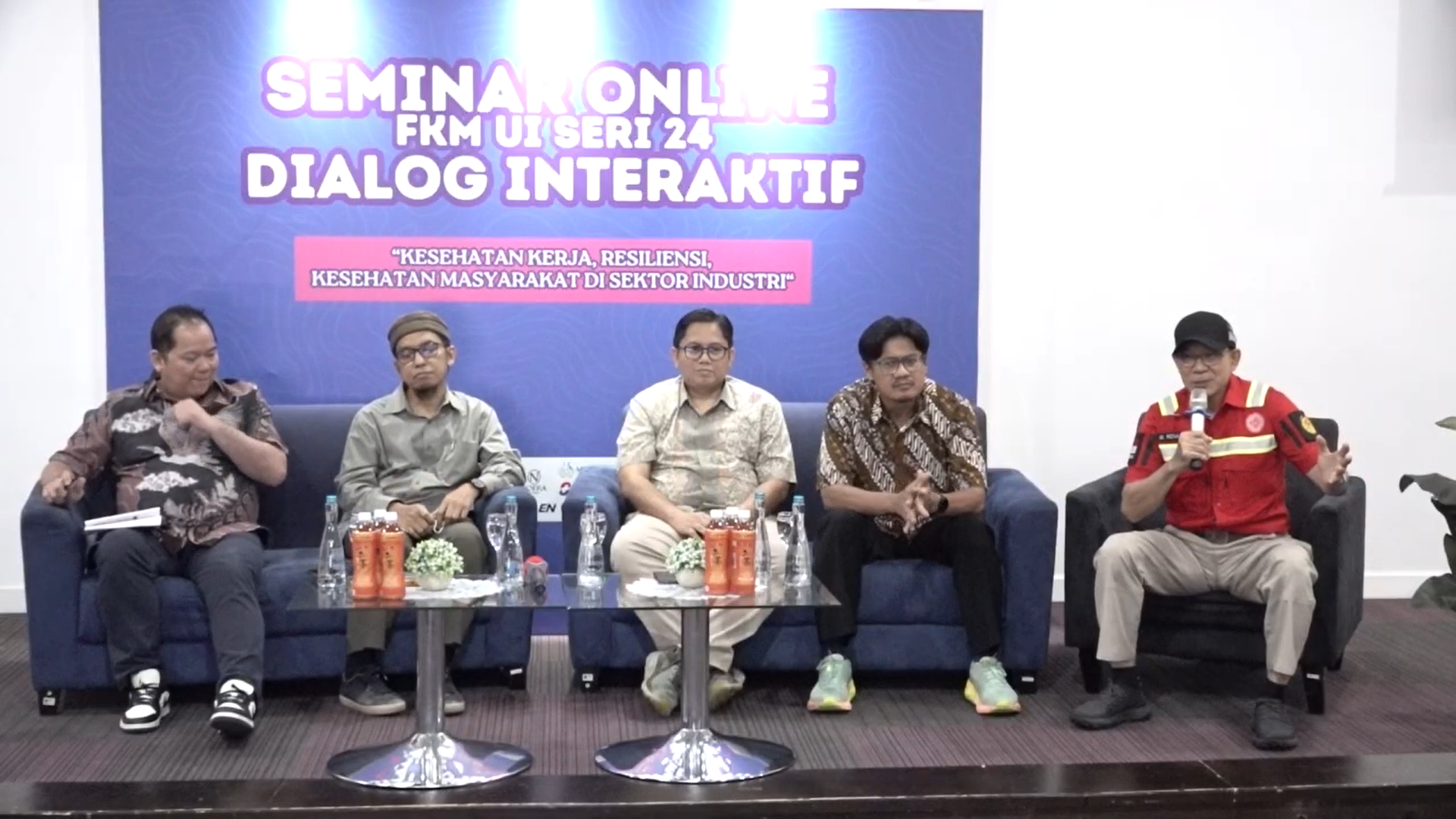On Saturday, November 23, 2024, the Faculty of Public Health (FPH) at the Universitas Indonesia (UI) organized the 24th series of the Online Seminar (SEMOL) and Interactive Dialogue. This event, initiated by students from the Master’s Program in Occupational Health and Safety (MOHS) at FPH UI, addressed the strategic topics of occupational health, resilience, and public health in the industrial sector. Held in a hybrid format, the seminar featured in-depth discussions with experts and was successfully attended by 740 participants, including academics, practitioners, and representatives from various industrial institutions. The 24th series of SEMOL, moderated by Louis S.M. Purba and dr. Renauld Koswiranagara, highlighted the urgency of occupational health and safety (OHS) issues amid the rapid development of the modern industrial sector.
In her opening speech, Dr. Ir. Asih Setiarini, M.Sc., Vice Dean for Education, Research, and Student Affairs at FPH UI, emphasized the importance of maintaining both the physical and mental health of workers amidst technological advancements and current labor challenges. “As a higher education institution, FPH UI is committed to producing experts who will make a tangible contribution to the field of occupational health and safety (OHS),” she stated. This sentiment was echoed by Prof. Dr. Robiana Modjo, S.K.M., M.Kes., a lecturer in Intermediate Public Health, who mentioned that the seminar was not only an academic necessity but also demonstrated the students’ concern for global issues. “Occupational health is a key pillar towards Indonesia’s Golden Vision 2045. I hope this seminar provides new insights from various perspectives—industry, practitioners, and academia,” said Prof. Robiana.
Yuli Adiratna, S.H., M.Hum., Director of Labor Standards Inspection at the Ministry of Manpower of the Republic of Indonesia, highlighted that of Indonesia’s 275.8 million population, 50.7%, or 139.8 million people, are active workers. This figure underscores the strategic role of workers as the backbone of families, economic drivers, and the generation builders of the nation. “Improving health literacy among workers not only influences the understanding and implementation of workplace health but also has a positive impact on their families and surrounding communities,” Yuli said.
Yuli further stressed that the workplace is a strategic location for health interventions. With a clear command structure, workplace-based interventions are considered effective, efficient, and have a high leverage to improve worker well-being. However, she reminded the audience of significant health challenges among workers, such as the increasing prevalence of mental health disorders, hypertension, obesity, diabetes mellitus, chronic kidney disease, infectious diseases, and work-related accidents. According to Yuli, these conditions require the comprehensive implementation of Occupational Health and Safety (OHS), not only as protective measures but also as a strategy to enhance productivity and worker well-being.
“Every worker needs protection from work-related risks and post-work risks. A healthy worker is a productive and prosperous worker,” emphasized Yuli. In this context, Yuli underlined the importance of implementing comprehensive occupational health programs, from promotional, preventive, curative, to rehabilitative efforts. Additionally, strengthening the competency of medical and health personnel in diagnosing work-related diseases, integrating healthcare services with BPJS Health and Manpower financing systems, and simplifying and harmonizing regulations in the field of occupational health would support the implementation of a comprehensive occupational health program.
Workplace leaders hold an important responsibility in meeting OHS requirements. This includes providing personal protective equipment (PPE) for workers, posting safety information, and ensuring compliance with safety regulations. She emphasized that occupational health is a strategic step to protect workers’ health and shield them from the negative effects of work. “Occupational health efforts aim to protect workers so they can live healthily and be free from the harmful effects of work. This is not only an obligation but an investment in national productivity,” Yuli concluded.
According to Dr. Hendra, S.K.M., M.K.K.K., Chairperson of the Indonesian Occupational Health Expert Association (PAKKI), managing the uncertainties in occupational health is crucial and must be designed by leaders and OHS experts. The changing dynamics of work, such as online work flexibility, present new challenges that require anticipation. “Uncertainty in occupational health is a real issue. As OHS experts, we must be able to predict and anticipate health-related factors,” explained Dr. Hendra. He added that new breakthroughs need to be developed to address risks and deviations in occupational health efforts.
Meanwhile, dr. Eddy, M.K.K.K., Chairman of the Indonesian Occupational Health Doctors Association (DKKI), highlighted the importance of maintaining the health of medical personnel, especially in high-risk fields such as radiology. Eddy stressed that healthcare workers must always be in optimal condition to provide the best service to patients. “Radiology is one of the high-risk aspects of the medical field. Consultation is necessary if healthcare workers and patients experience the effects of radiological exposure to ensure their health is maintained,” he said.
“From a technology implementation perspective, the digitalization of worker health data also plays a part in risk management,” said Taufik Riswandar, S.K.M., Occupational Health Industrial Hygiene Superintendent at Berau Coal. He mentioned that all worker data is integrated into a system, allowing health eligibility assessments based on job hazards and risks. The digitalization of data helps workers prevent accidents, work-related diseases, and improves their quality of life by mitigating risks such as heart disease or diabetes mellitus. Good system management also plays a key role in supporting occupational health in the industry.
Furthermore, Santoso, S.T., MM.KKKL., QRMA., ERMAP, Manager VP Business Support at KrisEnergy Limited, emphasized that managing OHS should be part of the overall business management, not just on-site but also in building business collaborations. “Top management must be committed and find solutions to worker health problems, especially by considering the health impact in business calculations,” explained Santoso.
The 24th series of the Online Seminar (SEMOL) once again demonstrated FPH UI’s commitment as a pioneer in developing insights and solutions to the challenges of occupational health in Indonesia. An integrated and innovative approach is key to facing occupational health challenges in the modern era. (DFD)

